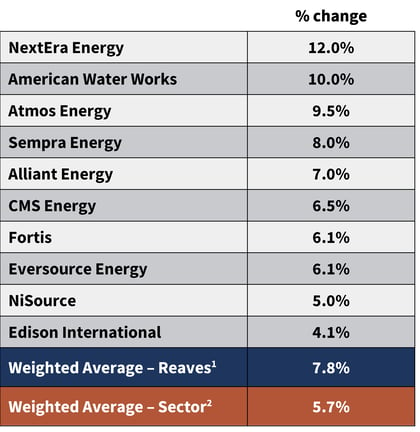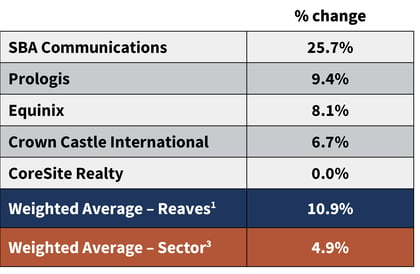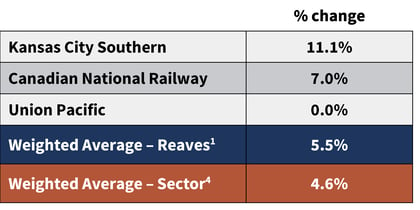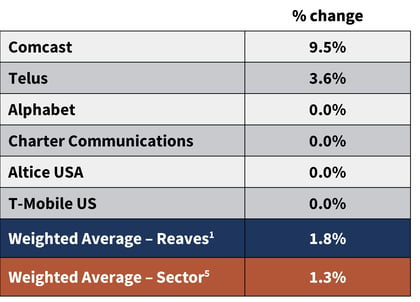Included in the characteristics we favor in essential service infrastructure companies is their ability to pay and consistently increase their dividends.
The reasons are straightforward: Dividend payments reflect a company’s current financial strength, and the rate and frequency of dividend increases signal management’s confidence in its ability to generate and grow future cash flow.
While this historic year has presented a myriad of challenges for all companies, we are encouraged by the number of stocks in our managed portfolios that have reported dividend growth over the last year. In the tables below, we have sorted the companies we own by industry sector, and also shown their rate of dividend growth relative to that of the overall sector.
Utilities Sector
The table below shows the annual dividend increase for each Utilities stock owned as of June 30, 2020 in a composite of portfolios1 managed with the Reaves Long Term Value Strategy.

Real Estate Sector
The table below shows the annual dividend increase for each Real Estate stock owned as of June 30, 2020 in a composite of portfolios1 managed with the Reaves Long Term Value Strategy.

Industrials Sector
The table below shows the annual dividend increase for each Industrial stock owned as of June 30, 2020 in a composite of portfolios1 managed with the Reaves Long Term Value Strategy.

Communications Services Sector
The table below shows the annual dividend increase for each Communications Services stock owned as of June 30, 2020 in a composite of portfolios1 managed with the Reaves Long Term Value Strategy.

Stability of Earnings Impacts Dividend Growth
As we reported in a blog post earlier this year, by April, U.S. companies had already announced more dividend suspensions and cancelations than the previous 10 years combined. And the 142 companies reducing payouts to shareholders by April was on pace to be the most since 20096.
Against that backdrop, we’ve been pleased to see most of the holdings in our Long Term Value Strategy generate dividend growth in excess of their respective sector averages. We believe it speaks volumes about these companies’ business models, and the stability of their earnings.
Disclosures:
Reaves Asset Management is an investment adviser registered with the Securities and Exchange Commission under the Investment Advisers Act of 1940. Registration does not imply any skill or training. Reaves is a privately held, independently owned “S” corporation organized under the laws of the State of Delaware.
The information provided in this blog does not constitute, and should not be construed as, investment advice or recommendations with respect to the securities and sectors listed. Investors should consider the investment objective, risks, charges and expenses of all investments carefully before investing. Any projections, outlooks or estimates contained herein are forward looking statements based upon specific assumptions and should not be construed as indicative of any actual events that have occurred or may occur.
Reaves’ Long Term Value Strategy (Reaves LTV Strategy) seeks a high risk-adjusted total return. The strategy tends to be invested in relatively larger companies with strong balance sheets, good cash flow and a history of dividend growth. Core positions are accumulated in financially strong, high-quality companies and generally have the following characteristics: strong management, above industry-average growth rates, large/mid-market capitalization and low price-earnings multiples.
1Beginning December 2019, Reaves LTV Strategy is represented by the LTV SMA Wrap Composite. This composite contains those LTV discretionary portfolios with wrap (bundled) fees. Wrap accounts are charged a bundled fee which includes the wrap sponsor fee, as well as, Reaves’ investment advisory fee. Due to compliance requirements, the net-of-fees calculation is computed based on the highest annual fee assigned by any wrap sponsor who utilizes this portfolio in an investment wrap program (300 basis points from 1/1/03 through 12/31/16 and, effective 1/1/2017, 250 basis points). The LTV SMA Wrap Composite performance consists of money-weighted, time-weighted returns and it includes the reinvestment of all dividends and other earnings. The inception date of the composite is December 2002; however, the composite was created in January 2013. This composite has been managed in a similar manner to the LTV ERISA Composite which ended in December of 2019. The LTV SMA Wrap Composite does not represent all of Reaves’ assets under management.
2The S&P 500 Utilities Index is a capitalization-weighted index containing electric and gas utility stocks (including multiutilities and independent power producers). Prior to July 1996, this index included telecommunications equities.
3The S&P 500 Real Estate Index comprises stocks included in the S&P 500 that are classified as members of the real estate sector.
4The S&P 500 Industrials Index comprises those companies included in the S&P 500 that are classified as members of the industrials sector.
5The S&P 500 Communication Services Index comprises those companies included in the S&P 500 that are classified as members of the communication services sector.
6Wall Street Journal, April 28, 2020, “Companies Are Suspending Dividends at Fastest Pace in Years”
The LTV Strategy includes small positions in DTE Energy (utility) and holdings in the Energy sector. For the purposes of this blog, we have deemed these positions to be immaterial, and therefore, did not include them.
Weighted average is a calculation that takes into account the varying degrees of importance of the numbers in a data set. In calculating a weighted average, each number in the data set is multiplied by a predetermined weight before the final calculation is made.
Past performance is no guarantee of future results.
All investments involve risk, including loss of principal.
All data is presented in U.S. dollars.
Important Tax Information: Reaves Asset Management and its employees are not in the business of providing tax or legal advice to taxpayers. Any such taxpayer should seek advice based on the taxpayer’s particular circumstances from an independent tax adviser.



